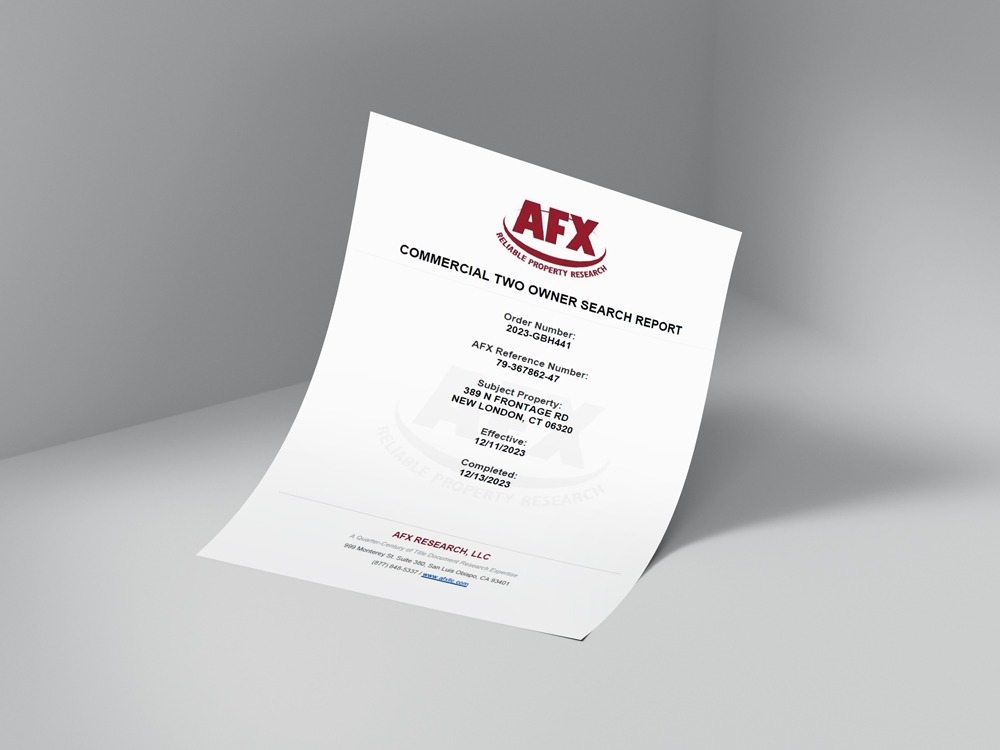The Solution for Comprehensive Fannie Mae Compliance The two-owner title search is among the most fundamental building blocks relevant in the context of real estate transactions, especially those involving foreclosure and refinancing. It represents a historical record of property ownership going back to the deed before the current owner, usually identified as the mortgagor. This search is designed to be certain that there are no hidden claims, liens, or other encumbrances related to the property's title. As required by Fannie Mae, this search is done as an uninsured title report-meaning no title insurance and no guarantee-as a way of keeping costs as low as possible while still performing due diligence on the investigation.
At AFX, we possess the acumen and capabilities for two-owner title searches to meet industry standards in maintaining the rigid cost guidelines brought forth from Fannie Mae. Our service ensures ownership verification and early identification of any potential title issues with a property. Whether you're a lender, servicer, or foreclosure professional, a two-owner title search offers just the kind of accuracy and detail you need to progress with certainty through most real estate transactions.

Two-owner title search refers to a method of examining the ownership history of an estate by tracing back the title two deeds, starting from the present owner's deed-the mortgagor's deed-extending to the prior deed. By such a search, it would be clear whether the chain of ownership is complete, the property has been properly transferred between parties, and there are no legal issues that can hang up the transaction.
The search also includes open encumbrances, which could be anything from liens, mortgages, and judgments to easements and other legal restrictions to property use. A two-owner title search essentially gives lenders and any other interested parties in the transaction peace of mind by uncovering potential claims or disputes.
This type of search is extremely significant in foreclosures, wherein the determination of title is one of the key means of ensuring that the party declaring foreclosure has the legal capacity to do so. Failure to check such information may result in delaying the foreclosure process or worse, being contested on legal grounds.

AFX Two-Owner Title Search Report The two-owner title search report at AFX is prepared in conformity with Fannie Mae. Our report contains:
We trace the history of the title of the property two owners back, starting with the present owner going back to the deed before the mortgagor's deed. The property chain of ownership would hence be unquestionable and free from all kinds of legal disputes and challenges.
Our search encompasses the identification of open encumbrances on the property.
These include:
The above findings are very important in ascertaining that there are no outstanding claims or any litigation issues that may affect the title to the property.
It contains a succinct summary of all findings, outstanding issues, or concerns brought out during the search, hence making it easier for the stakeholders to peruse through the information and undertake a necessary action.
We include copies of all documents related to the title search, including but not limited to: deeds, mortgages, liens, and judgments. These documents provide a legal history of the property and any claims that exist against the property, thus providing full disclosure of the transaction.
Fannie Mae, one of the largest mortgage lenders in the U.S., demands two-owner title searches for various reasons:
The search is limited to two prior owners; Fannie Mae keeps it uninsured to keep the costs of the foreclosure process within a reasonable limit. Uninsured searches eliminate additional fees for title insurance, keeping the process much more affordable for both lenders and borrowers.
A two-owner title search ensures that there would be no break in the chain of ownership. Gaps or discrepancies in ownership history can be sorted out before proceeding further with the foreclosure or transaction.
Fannie Mae's guidelines aim to identify any encumbrances, such as liens or judgments, which may impact the foreclosure process. This extensive search ensures that all parties with legal interests in the property are correctly notified; hence, the possibility for future legal challenges is nonexistent.

This does not include the cost of title insurance and guarantees, thus constituting an uninsured title search. This falls in line with Fannie Mae's perception to ensure that costs related to foreclosure remain as low as possible. While title insurance may provide some assurance against unexpected claims or disputes, it is not considered critical for all transactions, when one just needs to verify ownership and identify encumbrances.
By providing an uninsured search, AFX ensures that lenders and foreclosure professionals get the information they need, without added expenses for insurance products that may well not be needed by Fannie Mae.
When you use the services of AFX for your two-owner title search, you are guaranteed of:
Fannie Mae Compliance
Our title reports are specially prepared to meet all requirements that Fannie Mae has for foreclosure to make certain the capture of any necessary information and costs within permissible limits.
Nationwide Coverage
AFX offers title search services in all states, making it convenient to get accurate, compliant reports in any state for lenders and foreclosure professionals alike.
Seasoned Researchers
Our experienced title researchers conduct thorough and detailed searches, utilizing official land records and governmental repositories. With years of experience in the industry, we know what to look for and how to uncover even the most obscure issues that may affect a property's title.
Cost-Effective
By focusing our efforts on uninsured searches, we can help keep foreclosure-related expenses to a minimum for our clients, without sacrificing the quality or comprehensiveness of the title search.
A two-owner title search is quite important in the various classes of parties that usually deal in real estate transactions, mainly within the contexts of foreclosures: